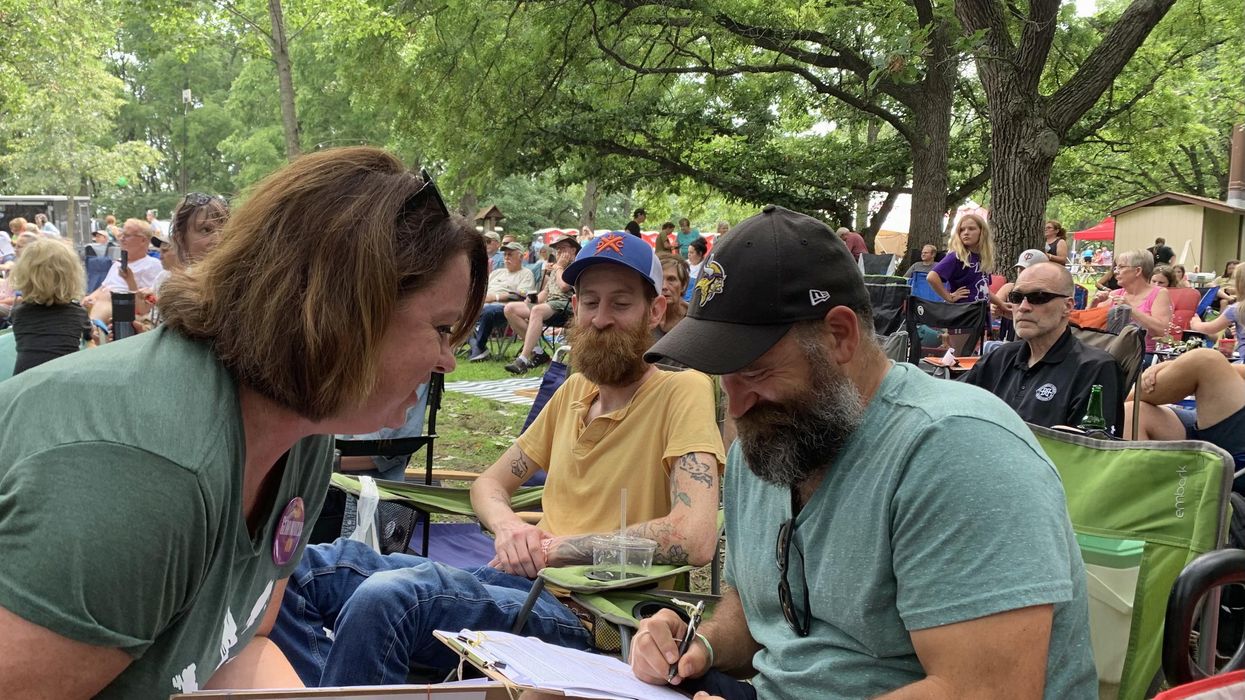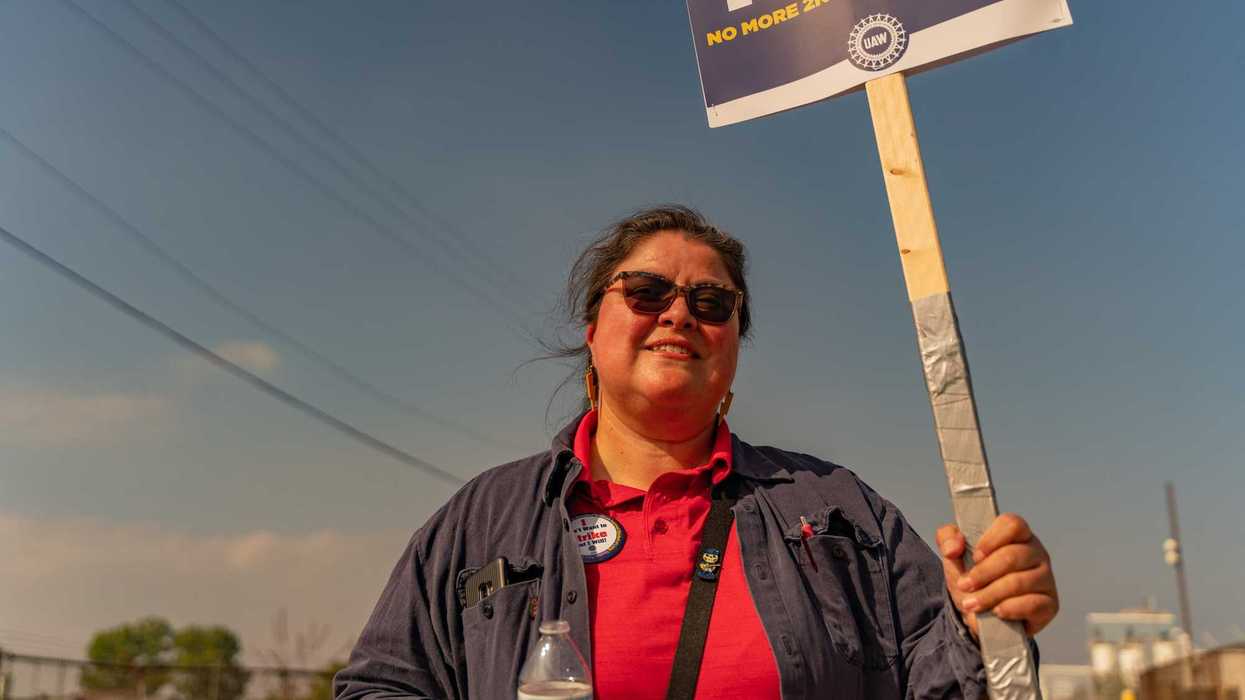Since organizing the Voters Not Politicians 2018 ballot initiative that put citizens in charge of drawing Michigan's legislative maps, Fahey has been the founding executive director of The People, which is forming statewide networks to promote government accountability. She regularly interviews colleagues in the world of democracy reform for our Opinion section.
Amy Scott-Stoltz is the president of the League of Women Voters of South Dakota. Born and raised in Sioux Falls, Amy is a committed and deeply engaged community leader, whose strong civic spirit compelled her to lead the current campaign for redistricting reform in her state.
Our conversation has been edited for clarity and brevity.
Fahey: How did you become involved with the League of Women Voters SD and this campaign, specifically?
Scott-Stoltz: My mom was a League of Women Voters member starting back in the '70s, so I've been around the organization since birth and grew up with a civic spirit. I officially joined the League when I had my son 18 years ago.
Nationally, the League is focusing on redistricting. I took a deep dive into redistricting in South Dakota, looking at previous gerrymandering and ways the process could be improved.
Fahey: How has gerrymandering impacted previous elections in South Dakota, and why is reform needed?
Scott-Stoltz: The lawsuit Bone Shirt v. Hazeltine alleged that the state legislature's 2001 map packed Native American voters into one district, limiting their electoral impact and violating the Voting Rights Act. The Native Americans won their court case, but there were no lawsuits stemming from the 2010 redistricting cycle — the spotlight had dwindled, while gerrymandering had gotten worse.
Over the past three decades, the number of registered Republicans in South Dakota has remained steady at around 49 percent, while the number of Republican state legislators has increased from 65 percent to 90 percent. Currently, 86 percent of our legislative districts have more Republicans than Democrats.
A question I often get is, 'Why wasn't this an issue earlier?' Gerrymandering has always been an issue, but the advent of advanced technology has made it easier to gerrymander down to the census block.
Fahey: Please explain the reform that Drawn Together SD is promoting. How would it change redistricting in your state?
Scott-Stoltz: Our petition is bringing forward an independent commission that allows citizens, not politicians, to create South Dakota's legislative maps. To ensure true bipartisanship, no more than three out of nine commissioners may be affiliated with the same political party, and each must have been continuously registered with their party for three years. During the three years before and after the redistricting cycle, commissioners cannot be appointed or elected to public office. In drawing maps, the commission cannot use voter registration data or other data that reveals voting trends — it must preserve communities of interest, and partisan gerrymandering is finally made illegal.
Fahey: Republican overrepresentation is the evidence of gerrymandering in South Dakota, but this is a nonpartisan petition. How do you pitch this reform to voters across the political spectrum?
Scott-Stoltz: The idea of free and fair elections is our focus, and it all starts with how the lines are drawn. Getting to the polls and voting is the second step. Democracy really does take precedence over partisanship for most people in the United States.
Fahey: How can people support your effort to end gerrymandering in South Dakota?
Scott-Stoltz: Our website has information on signing our petition and volunteer opportunities, as well as making a donation — it is very expensive to run a petition campaign. We can also be contacted via email at info@drawntogetherSD.com.
Fahey: How is the redistricting process playing out right now in South Dakota?
Scott-Stoltz: A legislative committee is working on redistricting, and it plans to approve its map in a special session on Nov. 8. The census data release was delayed from April to this month, so the timeline is compressed. The redistricting committee has 15 legislators and 13 are from the same party, so the opportunity for gerrymandering is there.
The committee will hold public hearings in October. About a month before that, the League will hold in-person and online meetings to educate voters on redistricting and ways they can get involved.
Fahey: What previous attempts have there been to pass redistricting reform in South Dakota?
Scott-Stoltz: A similar ballot question, which would have created an independent commission, appeared in 2016. It failed to pass, but still received 43 percent of the vote. In 2020, our coalition formed to support a resolution in the state legislature which would have established an independent redistricting commission. The motion failed in a committee with nine out of 11 members from the same party. We have not given up. Since starting our petition drive, our coalition has expanded. We have members across the state in rural and urban communities, including Native American communities.
Fahey: Beyond Bone Shirt v. Hazeltine, could you explain how South Dakota voting laws have impacted the Native American population?
Scott-Stoltz: The Native American community in South Dakota did not have full participation in state government until 1980. Before then, residents of unincorporated counties — mainly containing reservations — could not hold public office. As recently as 2012, the secretary of state removed early voting satellite offices from a reservation. Instead of having 46 days to vote early like the rest of the state, Native American residents had only 6 days to vote locally — some had to travel for hours to reach an early voting site over the preceding 40 days. In response, the Native American population successfully sued the state.
The poorest county in America is a Native American reservation in South Dakota. With so many other pressing needs, the Native American population in the state has historically struggled to focus on voting rights and fair representation. In recent years, they've become strong advocates for themselves and important partners of Drawn Together SD.
Fahey: What will it take for your proposed amendment to be implemented?
Scott-Stoltz: For our proposed amendment to appear on the 2022 ballot, our petition needs nearly 34,000 signatures by Nov. 8. It will take a huge push to get it through, and we could use all the help we can get.
Fahey: What has been the biggest obstacle of your campaign?
Scott-Stoltz: The biggest obstacles are the things we can't control, such as the Covid-19 pandemic and weather — we've had heat waves recently — that make it hard to get out in places where people gather. We have a good response when we are able to collect signatures, as most people are willing to sign.
Fahey: If you were speaking with a high school student or a new immigrant to the country, how would you describe what being an American means to you?
Scott-Stoltz: Being American is both a freedom and a responsibility. All of our freedoms come with a responsibility to not only fight to maintain them, but to make sure that we are fighting for the freedoms of others.




















Why does the Trump family always get a pass?